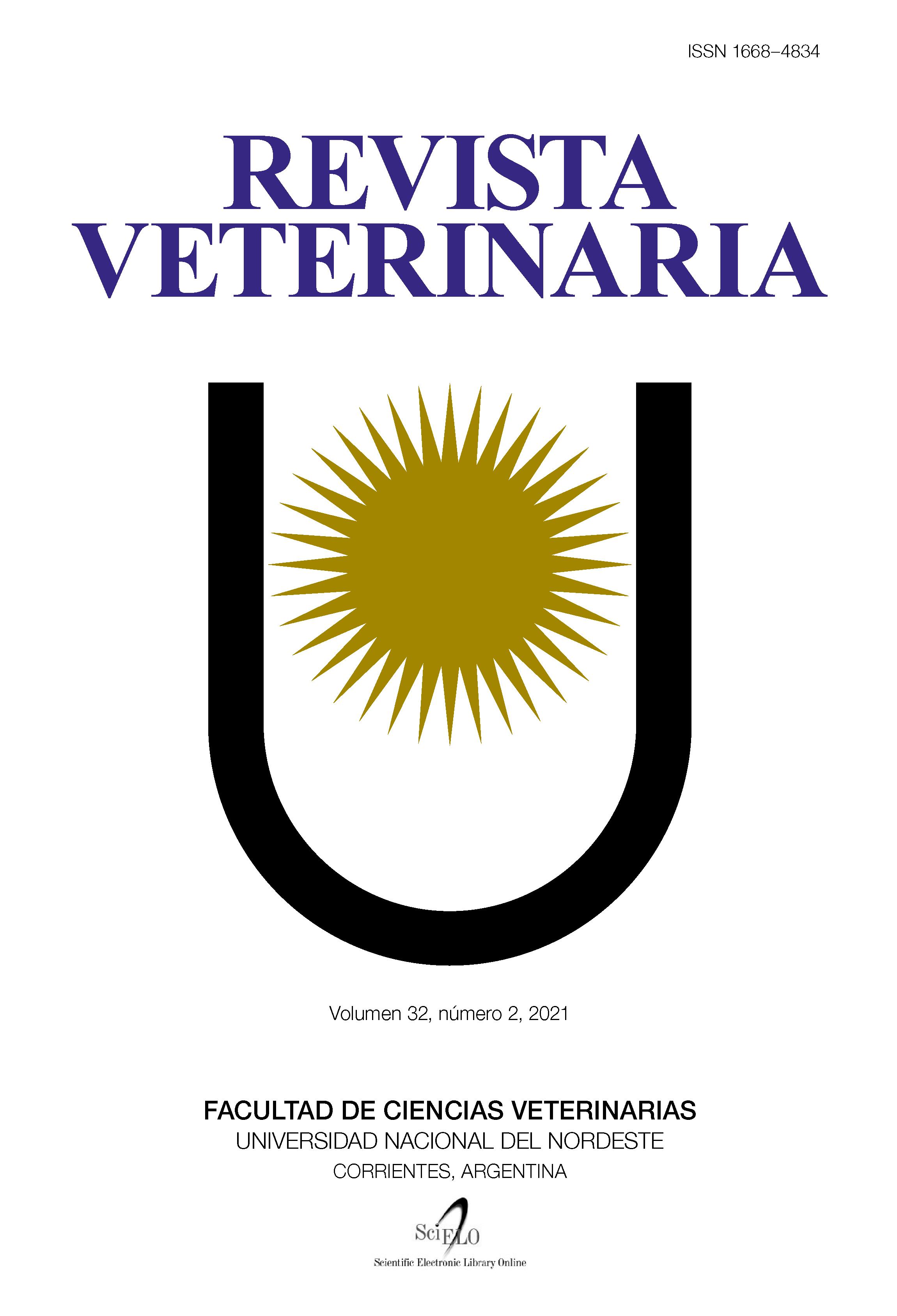Evaluación de la suplementación de creatina sobre el desempeño productivo y variables bioquímicas en lechones al destete
DOI:
https://doi.org/10.30972/vet.3225749Palabras clave:
Lechones, destete, creatina, suplementoResumen
El destete es considerado como el período más estresante en la producción porcina y se asocia con trastornos intestinales, musculares y bajo rendimiento productivo. Estudios demuestran que la suplementación de creatina favorece la síntesis proteica. El objetivo de este trabajo de investigación fue evaluar el efecto de la suple- mentación de creatina en lechones mediante la medición del rendimiento productivo y pruebas bioquímicas en sangre. El trabajo de investigación se realizó en el Centro Experimental Uyumbicho (CEU) perteneciente a la Facultad de Medicina Veterinaria y Zootecnia de la Universidad Central del Ecuador. Se utilizó un total de 16 lechones (Landrace x Yorkshire x Pietrain x Duroc). Los lechones se distribuyeron de manera aleatoria en cada uno de los 4 tratamientos: T1 = testigo 1 (sin suplemento lácteo), T2 = testigo 2 (suplemento lácteo), T3 = suplemento lácteo + creatina (0.5%), T4 = suplemento lácteo + creatina (1%). Los lechones que recibieron creatina al 1% presentaron el mayor consumo diario de alimento (0.432 kg/ día) y la mayor ganancia diaria de peso (0.336 kg/día) (42 días edad) y la mejor conversión alimenticia (1.288 kg/kg) (62 días de edad). La enzima creatina cinasa presentó el valor más elevado (2007.5 UL) en los lechones del grupo testigo 1. El uso de un sustituto lácteo y la suplementación de creatina mitiga los efectos adversos post-destete en lechones.
Descargas
Citas
Boundry C, Dehoux JP, Portetelle D, Buldgen A. 2008. Bovine colostrum as a natural growth promoter for newly weaned piglets: a review. Biotechnol Agron Soc Envir 12: 2, 157-170.
Brosnan JT et al. 2009. Creatine synthesis is a major metabolic process in neonatal piglets and has important implications for amino acid metabolism and methyl balance. J Nutr 139: 7, 1292-1297.
Campbell JM , Crenshaw JD , Polo J. 2013. The biological stress of early weaned piglets. J Anim Sci Biotechnol 4: 1, 19.
Cella PS et al. 2020. Creatine supplementation in Walker-256 tumor-bearing rats prevents skeletal muscle atrophy by attenuating systemic inflammation and protein degradation signaling. Eur J Nutr 59: 2, 661-669.
Cunningham JG , Klein BG. 2014. Fisiología Veterinaria, 5ta ed., Elsevier, Barcelona, p. 298-317.
Dinesh OC, Bertolo RF, Brunton JA. 2017. Creatine supplementation to total parenteral nutrition improves creatine status and supports greater liver and kidney protein synthesis in neonatal piglets. PediatrRes 83: 1, 135-141.
Gresse R et al. 2017. Gutmicrobiota dysbiosis in postweaning piglets: understanding the keys to health. Trends Microbiol 25: 10, 851-873.
Guzik AC, Southern LL, Matthews JO , Bidner TD, Ladner JP. 2000. Ornithine alpha-ketoglutarate and creatine effects on growth and plasma metabolites of nursery pigs. J Anim Sci 78: 4, 1022-1028.
Kluess J, Schoenhusen U, Souffrant WB, Jones PH, Miller BG. 2010. Impact of diet composition on ileal digestibility and small intestinal morphology in earlyweaned pigs fitted with a T-cannula. Animal 4: 4, 586-594.
Lalles JP, Bosi P, Smidt H, Stokes CR. 2007. Nutritional management of gut health in pigs around weaning. Proc Nutr Soc 66: 2, 260-268.
Leonard SG, Sweeney T, Buhar B, Lynch BP, O’Doherty J V. 2011. Effects of dietary seaweed extract supplementation in sows and post-weaned pigs on performance, intestinal morphology, intestinal microflora and immune status. Br J N utr 106: 5, 688-699.
Li JL et al. 2016. Effect of creatine monohydrate supplementation on carcass traits, meat quality and postmortem energy metabolism of finishing pigs. Anim Prod Sci 56: 1, 48-54. 13. Miller E R et al. 1962. Creatine in diet of the baby pig. J Anim Sci 21: 3, 458-460.
Moeser AJ, Pohl CS, Rajput M. 2017. Weaning stress and gastrointestinal barrier development: implications for lifelong gut health in pigs. Anim Nutr 3: 4, 313-321.
National Research Council. 2012. Nutrient requirements of swine, 11 thed., National Academies Press, Washington, p. 289-295. 16. Puskle JR , T urpin DL, Kim JC . 2018. Gastrointestinal tract (gut) health in the young pig. Anim Nutr 4: 2, 187-196.
Sestili P et al. 2009. Creatine supplementation prevents the inhibition of myogenic differentiation in oxidatively injured C2C12 murine myoblasts. Mol Nutr Food Res 53: 9, 1187-1204.
Sestili Pet al. New insights into the trophic and cytoprotective effects of creatine in in vitro and in vivo models of cell maturation. Amino Acids 48: 8, 1897-1911.
Simon O. 2010. An interdisciplinary study on the mode of action of probiotics in pigs. J Anim Feed Sci 19: 2, 230-243. 20. Solá OD, Gasa J. 2017. Feeding strategies in pig production: Sows and their piglets. Anim Feed Sci Technol 233: 34-52.
Souza TC et al. 2012. Cambios nutrimentales en el lechón y desarrollo morfofisiológico de su aparato digestivo. Vet M ex 43: 2, 155-173.
Stahl CA, Allee GL, Berg EP. 2001. Creatine monohydrate supplemented in swine finishing diets and fresh pork quality: II. Commercial applications. J Anim Sci 79: 12, 3081-3086.
Sugiharto S, Hedem ann MS, Lauridsen C. 2014. Plasma metabolomic profiles and immune responses of piglets after weaning and challenge with E. coli. J Anim Sci Biotechnol 5: 1, 17.
Vallet JL , Miles JR , Rempel LA. 2013. Effect of creatine supplementation during the last week of gestation on birth intervals, stillbirth, and preweaning mortality in pigs. J Anim Sci 91: 5, 2122-2132.
Varley M, Wiseman J. 2001. The weaner pig: nutrition and management, 1st ed., CABI, New York, p. 223-243. 26. Wijtten PJ, Meulen J, Verstegen MW. 2011. Intestinal barrier function and absorption in pigs after weaning: a review. Br J Nutr 105: 7, 967-981.
Descargas
Publicado
Cómo citar
Número
Sección
Licencia
Política de acceso abierto
Esta revista proporciona un acceso abierto inmediato a su contenido, basado en el principio de que ofrecer al público un acceso libre a las investigaciones ayuda a un mayor intercambio global de conocimiento. La publicación por parte de terceros será autorizada por Revista Veterinaria toda vez que se la reconozca debidamente y en forma explícita como lugar de publicación del original.
Esta obra está bajo una licencia de Creative Commons Reconocimiento-NoComercial 4.0 Internacional (CC BY-NC 4.0)










.jpg)
.jpg)



